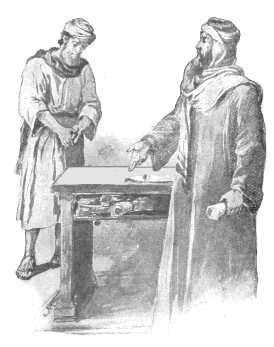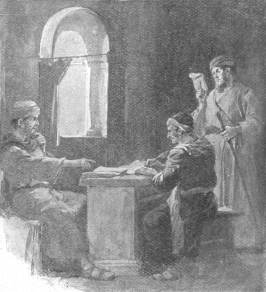|
Text
|
Comments
|
.1
¶ And he said also unto his disciples, There was a certain rich man,
which had a steward; and the same was accused unto him that he had wasted
his goods.
.2
And he called him, and said unto him, How is it that I hear this of thee?
give an account of thy stewardship; for thou mayest be no longer steward.
3 Then the steward said
within himself, What shall I do? for my lord taketh away from me the stewardship:
I cannot dig; to beg I am ashamed.
.4
I am resolved what to do, that, when I am put out [or
"whenever I may be put out"] of the stewardship, they may receive
me into their houses. |
1 -
Unto
his disciples Whether some or all of the twelve or simply His
followers at the time, we do not know. The Pharisees were listening v14.
The story He was about to tell, in a special way, helps us understand the
next one about the rich man and Lazarus.
1 -
A
certain rich man The parable of the rich man and Lazarus in
the latter part of this chapter begins the same way. Both parables are
about how to live in preparation for the future life.
1 -
Steward
One who manages the affairs of another.
2 -
Give
an account Provide the records. The master had apparently had
the necessary information. We find a similar judgment in the story of the
talents. See on mt2519.
4 -
I
am resolved Dishonesty leads to deeper dishonesty and sin. The
man did have a choice. He could have learned to dig or he could
have begged. Either of these options, however, would have hurt his pride.
Being received may mean enjoying the benefits of bribery. |
 .5
So he called every one of his lord's debtors unto him, and said unto the
first, How much owest thou unto my lord? .5
So he called every one of his lord's debtors unto him, and said unto the
first, How much owest thou unto my lord?
6 And he said, An hundred
measures of oil. And he said unto him, Take thy bill, and sit down quickly,
and write fifty.
7 Then said he to another,
And how much owest thou? And he said, An hundred measures of wheat. And
he said unto him, Take thy bill, and write fourscore.
.8
And the lord [master/owner] commended the unjust steward, because he had
done wisely: for the children of this world are in their generation wiser
than the children of light.
5
-
Called every one Or "summoning his master's debtors one
by one."
6 -
Measures
A measure was under 6 gallons. The "oil" was probably olive oil.
6 -
Bill
Literally "writings."
7 -
Measures
About 6¼ bushels. This is about 375 pounds or 170 kg.
8 -
Commended
Jesus would certainly not have been recommending this behavior. His point
was, If you want the destiny of the unrighteous (to live in their houses
v4),
then follow the mammon of unrighteousness (greed). It was behavior He was
warning them against.
8 -
Wiser
than How diligently do we reach out to lost souls? |
| .9
And I say unto you, Make to yourselves friends of the mammon of unrighteousness;
that, when ye fail, they may receive you into everlasting habitations. |
9 -
Make
... friends Notice the plural. Jesus is speaking to his disciples
v1 but Jewish leaders were listening verse1 and, below
verse
14.
9 -
Everlasting
habitations This is expanded in the story of the rich man an
Lazarus which follows shortly. |
.10
He that is faithful in that which is least is faithful also in much: and
he that is unjust in the least is unjust also in much.
11 If therefore ye have
not been faithful in the unrighteous mammon, who will commit to your trust
the true riches?
12 And if ye have not
been faithful in that which is another man's, who shall give you that which
is your own? |
10
- Faithful in ... least ...
much This expands the idea of simply faithful or unfaithful.
Some want a little of both.
11
- Notice the implication. Those who are unfaithful in secular maters
will not be faithful in the "true riches" of spiritual things.
12
- Another sentence Jesus invites us to ponder. |
.13
No servant can serve two masters: for either he will hate the one, and
love the other; or else he will hold to the one, and despise the other.
Ye cannot serve God and mammon.
Two
masters The unfaithful steward
v1ff was
faithful to the wrong God. Also see the next verse below.
The statement appears
in practically the same form in mt0624.
Jesus repeated many principles like this.
Mammon
"A Chaldee [or Syriac] word signifying riches. Our Savior says
we cannot serve God and Mammon, Mt 6:24.
Wealth is as truly an idol to those who set their hearts on it, as Jupiter
or Diana; and no idolater can enter heaven. He also charges us, from
the example of the unjust steward, so to use worldly goods, which are generally
sought and used sinfully - "the unrighteous mammon" - as to have God the
Judge our friend, and receive the true riches in heaven, Lu
16:9,11." (ATS Dictionary) |
.14
And the Pharisees also, who were covetous [literally "money lovers"], heard
all these things: and they derided him.
.15
And he said unto them, Ye are they which justify yourselves before men;
but God knoweth your hearts: for that which is highly esteemed among men
is abomination in the sight of God. |
14
- Pharisees They didn't like the conclusion in v13.
They believed they could love God and money at the same time.
14
- Money Money is easy to love even when we don't have any.
Consider the lure of the lottery. Possessing it is not necessarily a problem.
15
- Justify yourselves They laughed at Him criticizing Him.
To them wealth was a sign of divine favor. Notice who commended his unfaithful
servant v1. They felt superior because Jesus had
essentially no earthly possessions
mt0820,
mt0624ff. |
.16
The law and the prophets were until John [John the Baptist]: since that
time the kingdom of God is preached, and every man presseth into it.
17 And it is easier
for heaven and earth to pass, than one tittle of the law to fail.
.18
Whosoever putteth away his wife, and marrieth another, committeth adultery:
and whosoever marrieth her that is put away from her husband committeth
adultery. |
16
- Law ... prophets ... until John Some see this verse as
marking a change in the way of salvation, from OT (Old Testament) to NT.
The same people would point to Jesus' keeping of the Sabbath as still following
the OT plan although obviously after John. The next verse clarifies. The
"law" was the books of Moses (including the ten commandments) and here
represented the OT.
17
- Easier See on mt0518.
18
- Marrieth another Sadly we so often see divorce planned
for the purpose of marriage to another partner. |

